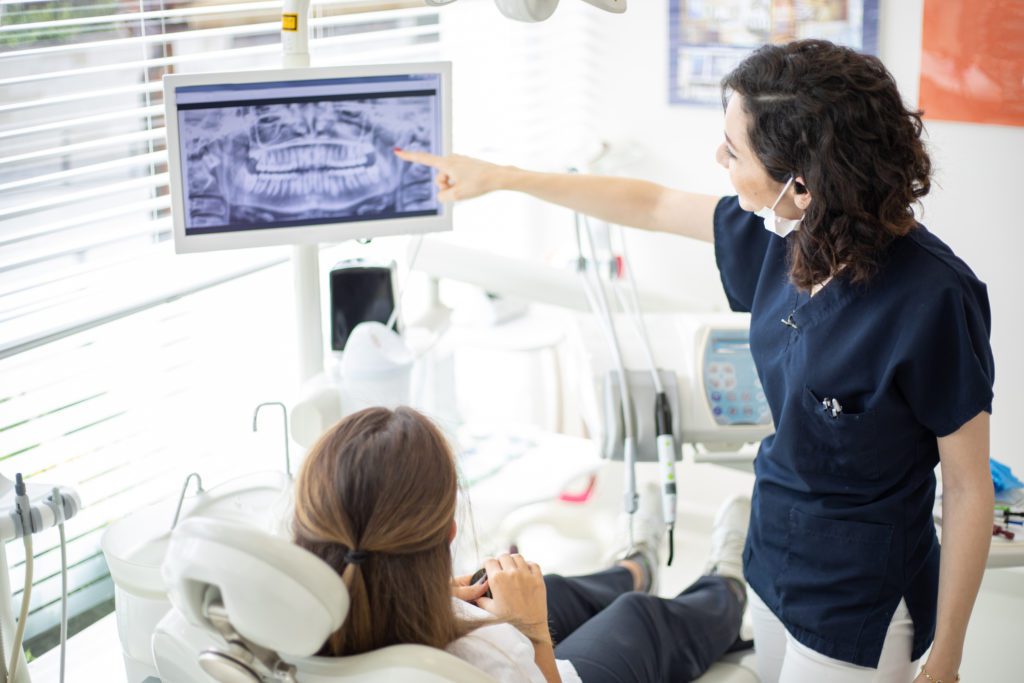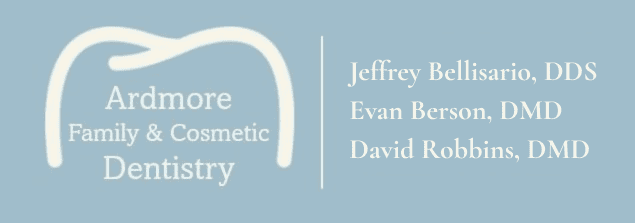Do you find yourself clenching your teeth when under stress? Are you waking up with frequent headaches? Receive TMJ treatment in Ardmore, PA today. TMJ disorders are caused by stress or injury to the temporomandibular joints (TMJ).
These joints, which aid in speaking and chewing, can cause pain and dysfunction. Dr. Jeffrey Bellisario provides restorative dental care to stop damage caused by TMJ disorders. He can stop painful and damaging symptoms that affect the health of the entire smile.

Signs of TMJ Disorders
There are multiple symptoms of TMJ disorders, including:
- Teeth clenching and grinding (Bruxism)
- Chronic headaches and migraines
- Earaches and facial pain
- Jaw clicking and popping
- Pain when biting and chewing
Call us if you notice any of these symptoms. At first, signs of TMD may occur unconsciously. Patients may clench and grind their teeth in stressful situations or even at night. If there are changes in your bite or you find that your jaw pops or clicks when chewing, contact our office. Our dentists can find the right option to reverse your TMD symptoms.
Common TMJ Treatments
We will often recommend physical therapy for patients with TMJ disorders. Patients learn the best facial, jaw, arms, and shoulder exercises during physical therapy. Posture and tension in the back, arms, and shoulders can worsen TMJ symptoms.
A nightguard is a great option for patients who clench and grind their teeth. This custom-made oral appliance is typically worn at night to stop bruxism at the source. It prevents further tooth wear and pain and alleviates pressure on the jaw muscles and joints.
We may recommend dental crowns, porcelain veneers, or dental bonding treatment for patients with tooth damage or wear due to TMJ disorders. These cosmetic and restorative treatments add structure to chipped and cracked teeth. They may also protect weakened teeth or teeth worn by continuous grinding and clenching.
Frequently Asked Questions
Do you have more questions about TMD? We’re here to help. Learn more with answers to common questions about treating TMJ in our Ardmore, PA, dental office.
Can TMJ disorders affect my teeth?
Yes. TMJ disorders can lead to teeth grinding or clenching, which can wear down your enamel over time. This can cause chips, cracks, or even make your teeth more sensitive. If the problem continues, it can also change how your teeth fit together when you bite. Treating TMJ disorders early can help protect your teeth from damage and prevent the need for bonding or crowns.
How do I know if my jaw pain is caused by TMJ or something else?
Jaw pain can happen for many reasons, like sinus infections, tooth problems, or an injury. TMJ-related pain often comes with other symptoms, such as jaw clicking or popping, headaches, earaches, or trouble chewing. If you’re not sure what’s causing your pain, Dr. Bellisario can examine your jaw and teeth to find out if it’s related to a TMJ disorder.
Can TMJ disorders go away on their own?
Sometimes, mild TMJ symptoms can go away on their own. You may see a reduction in symptoms if you rest your jaw, manage stress, and avoid habits like chewing gum or clenching your teeth. But you need professional treatment to stop further damage if the pain keeps coming back, gets worse, or starts to affect your bite.
Can TMJ disorders cause ear problems?
Yes. TMJ disorders can cause ear pain, ringing in the ears, or a feeling like your ear is full. This happens because your jaw joints are located very close to your ears. Problems in the joint can affect the nearby nerves and muscles.
Can poor posture make TMJ symptoms worse?
Yes. Poor posture can put extra strain on your jaw, neck, and shoulders. When you hunch over to look at your phone or sit slouched at a computer, your head moves forward and puts pressure on the muscles and joints that support your jaw. Over time, this added tension can make TMJ pain, stiffness, and clicking worse. Sitting up straight, keeping your shoulders relaxed, and holding your head in a natural position can help take stress off your jaw and reduce symptoms.
What foods should I avoid if I have TMJ pain?
If you have TMJ pain, you want to avoid foods that are hard, chewy, or crunchy because they make your jaw work harder. This includes things like nuts, chips, hard bread, chewy candy, and tough meats. Instead, choose softer foods like yogurt, eggs, mashed potatoes, and cooked vegetables. Soft foods give your jaw a chance to rest and heal while still letting you eat a healthy diet.
Dr. Bellisario will recommend that you eat soft foods for a couple of weeks when you begin TMJ treatment. You want to give your TMJ a chance to rest.
Do I need an ice pack or heat for TMJ pain?
Ice can reduce swelling and numb sharp pain, making it helpful right after your jaw feels sore or strained. Heat relaxes tight muscles and improves blood flow, which can ease stiffness and tension. Many people find it helpful to start with ice for the first day or two, then switch to heat. A dentist can help you decide which option is best for your symptoms.
How long does it take TMJ treatment to work?
The time it takes for TMJ treatment to work depends on how severe your symptoms are and what’s causing them. Some people start to feel better in just a few weeks with the right care and lifestyle changes. Others may need several months of treatment if their symptoms have been around for a long time. Following our dentist’s instructions and being consistent with your treatment can help you see results faster.
Contact Our Dental Office
Do you think you may have a TMJ disorder? Request a dental consultation with Dr. Bellisario on our website. You can also call (610) 839-8967. Please let us know if you have any questions about your treatment, and we can help!
